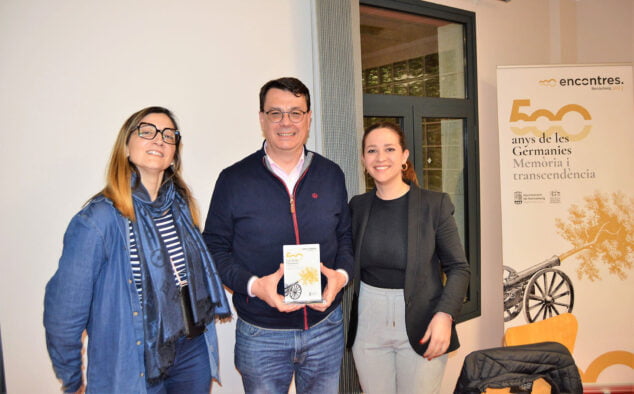The series of conferences Encounters Beniarbeig «500 years of the Germanies: memory and transcendence» has come to an end. And he did it last Thursday at the hands of Rafael Roca, a professor at the University of Valencia, during a conference entitled «La Germania vista pels escritors valencians de la Renaixença (1881-1935)».
During the event, Tomás Llopis, a member of the organizing committee, spoke about the importance of reviewing history to understand the present and explained that these reviews are made from current parameters, but always trying to understand the facts from the perspective of the moment in that occurred. According to the presenter, the Germania is an inexhaustible vein of stories that could have given rise to an abundant literary and even cinematographic production in normal circumstances that do not exist in the Valencian Community.
Professor Roca began his intervention by claiming knowledge of the social and political context that did not occur in the analyzes of the Renaissance carried out in late Francoism. The exhibition of images by Constantí Llombart and Teodor Llorente, painted by Ignasi Pinazo and Joaquim Sorolla respectively, served to situate the historical and aesthetic moment in which the Renaissance took place, a cultural movement that sought to be in harmony with European sensibility of the time, to review the historical past and, in the Valencian case, especially the change from the XNUMXth to the XNUMXth century. That is to say, from the most brilliant century of classical literature in this country to the impulse of the Castilianization of the Valencian aristocracy.
According to the speaker, it is key to understanding the time of the Renaissance and explaining the interest in the Germania of the intellectuals of the moment. It is worth taking into account the foundation of Lo Rat Penat in 1878, an entity that defended the Catalan nature of the language at all times, until a century later, due to political interests, it expelled Sanchis Guarner and other personalities from Valencianism and declared itself a secessionist and anti-catalanist. It was within Lo Rat Penat that Llorente and Llombart, together with Félix Pizcueta and Vicent W. Querol, disapproved the theses of Danvila y Collado's book The Germania of Valencia because he was trying to demystify the German revolt. He denied that it was "a precedent for contemporary struggles" and attacked Valencian history and identity.
Subsequently, the speaker reviewed some vindicative works of the Germania such as the drama The undercover of Valencia by Antoni García Gutiérrez, an Andalusian living in Valencia. Later he still published Juan Lorenzo, another liberal-leaning drama. During the exhibition it became clear that it was in the XNUMXs when there was a recovery of Germania as a literary theme.
The work of the historian Vicent Boix History of the city and Kingdom of Valencia (1845-1847) it gives a point of prominence to the Germania throughout the forty pages that it dedicates to it, and constitutes the starting point of a review in a federalist key of the artisan revolt.
In line with these reflections, Rafael Roca reviewed the role of Teodor Llorente, Vicent W. Querol and Blasco Ibáñez, highlighting the importance of recovering the Jocs Florals, a medieval tradition that, according to the speaker, helps draw a panorama that explains the tensions , gains and failures of the Renaissance from a modern perspective. Professor Roca recalled that in the context of a strongly centralized Spain, which prohibited any language other than Castilian, the men of the Renaissance helped to vindicate the Valencian identity, but always conditioned by the fear of provoking any fear of political secessionism. "Could they have done more? Can we do more?», asked Roca to show the need to take into account the conditions of each era.
At the end of the exhibition, a lively and interesting discussion took place with interventions from the public that addressed the role of blasquism in the vindication of the work of Llorente and the comparison with the current Valencian culture. These Encounters 2023, a series of conferences that, beyond claiming a crucial historical fact of the Valencian Country, demonstrated that the enhancement of the Germania, its memory and the recovery of the collective memory of the Valencians is a challenge and an obligation that we must assume










